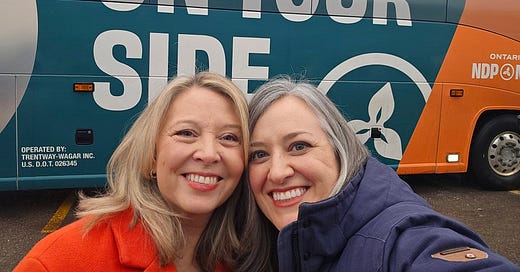Until yesterday, it had been a while – nine weeks, to be exact – since I last wrote here. In that time, I left Syntax Strategic (with great appreciation to Jennifer Stewart and Jennifer Madigan and love to some of the best teammates and colleagues a guy could ask for) and I jumped back into campaign life, managing the campaign to re-elect Jennifer French in Oshawa during the Ontario election.
The rumours of an early election had been swirling for months. Ford’s team wanted to go before his scandals built up more steam and, more importantly, before Justin Trudeau’s inevitable exit removed a much-needed and effective foil. Ford just needed a justifiable excuse. Enter Donald Trump.
I doubt Ford will ever admit it, but Trump handed him a gift. I’m not saying the premier wanted an economic crisis or an American president openly threatening Canada. But when Trump’s chaos arrived, Ford wrapped himself in the flag, slapped on his now-famous campaign hat, and made the election about defending Ontario from U.S. tariffs. No one was talking about his scandals, his push to privatize health care, or the worsening affordability crisis. Ford played the hand he was dealt, and he played it well.
Ford was playing with a stacked deck, but even with the same cards up his sleeve, Pierre Poilievre couldn’t make the provincial luck translate to the federal level. Just months ago, Pierre Poilievre’s anti-Trudeau message was cutting through. But with Trump looming over everything, Canadians started looking for leaders who would actually stand up to the American president. Unlike Ford, whose populist instincts let him seize that role, Poilievre looks weak. Beating up on a wounded Trudeau is one thing. Looking like you’d roll over if Washington asked is another.
Meanwhile, Liberal fortunes did flow in the other direction. The Ontario Liberals found themselves buoyed by the federal leadership race and Mark Carney’s growing profile. They pushed their vote share to nearly 30%. In an ironic turn against the party that always refuses to support proportional representation, the Liberals’ popular vote gains weren’t enough to translate into many seats. Their support remains too spread out – strong on paper, but not where it counts. That said, regaining official party status does mean more resources, and that alone makes them a bigger threat to the NDP moving forward.
For Marit Stiles, that challenge also presents an opportunity. The NDP held onto Official Opposition, proving their resilience in key ridings. But as the Liberals rebuild, the NDP can’t afford to just play defence. Stiles has the talent, likeability, and broad appeal to take the party further. She needs to build from the election and keep working to introduce herself to Ontarians beyond the usual NDP strongholds. If she does, she has a real shot at being the alternative to the premier when voters inevitably start looking for one.
If Trump doesn’t succeed in tearing our country, democracy as we know it, or maybe the planet apart, Ford’s scandals will catch up with him. And even if they don’t, people will eventually get tired of him and look for the next new thing. Things happen fast in politics. Today’s hero can quickly become tomorrow’s scapegoat – just ask Justin Trudeau.
In ridings like Oshawa, this election wasn’t just about party strategy. It was about trust. Trump’s tariffs will hurt the entire country, but places like Oshawa and southwestern Ontario will feel it worst. In these communities, people know they can count on their Ontario NDP MPPs.
At door after door, we met people glued to 24-hour news channels, anxiously watching updates, worried about what was coming. Even those who liked Ford’s tough talk knew, when it came down to it, that Jennifer French had their backs.
In 2018, when GM announced it was shutting down operations in Oshawa, Doug Ford threw up his hands and said it was too late to fight back. Jennifer French didn’t accept that. She stood with autoworkers, fought alongside them to protect their jobs, and GM stayed. That kind of leadership and solidarity isn’t forgotten.
French, like many of her NDP colleagues, didn’t win because of some grand political wave. While she benefited from the central campaign and Marit Stiles, the work she put in between elections put her over the edge. Her community office is a lifeline in a riding surrounded by Conservative blue. Even people from those neighbouring Conservative ridings know they can count on her when it matters. That’s why she won.
There’s a lesson here – not just for the NDP, but for every politician who wants to hold onto their seat. Campaigns don’t end on election day. Many political strategists (me included) will tell you a good local candidate can add five to seven percent to the total vote share in an election (there are rare exceptions who push that further). Five to seven percent might not sound like much, but it’s often the difference between winning and losing. The work done between elections – the fights taken on, the people stood up for – that’s what earns trust. In this election, Ontario NDP MPPs proved they understand that and do the work to earn the trust and support of the people in their communities.
Ford may have benefited from perfect timing, but luck doesn’t last forever. The leaders who stick around when the cameras are gone – those are the ones who last.





They didn’t get booted until quite late in the campaign. And, I’d you look at the results, the candidate still got roughly the Liberal’s usual share of the vote.
George — how did the absence of a Liberal candidate affect the outcome?